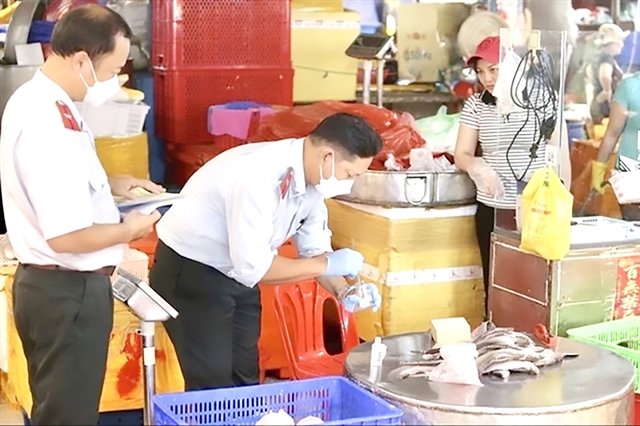 Society
Society

 |
| Officials from HCM City's Food Safety Management Board carry out an inspection at Bình Điền wholesale market. Photo thanhnien.vn |
HÀ NỘI - Despite having food safety certificates, many facilities continue to purchase substances of unknown origins, said Deputy Minister of Health Đỗ Xuân Tuyên.
The ministry reports that in the first five months of this year, there were 36 incidences of food poisoning, affecting 2,100 individuals and resulting in six deaths.
Although the number of cases declined compared to the same period last year, there were more serious poisonings on a larger scale, sometimes involving hundreds of patients.
Tuyên said the ministry instructed medical facilities to treat victims in order to reduce the number of fatalities. Facilities that failed to guarantee food safety have been ordered to cease operations.
Agencies also tracked food origins in those cases to identify the causes and found that some facilities which possessed food safety certificates still imported ingredients of unclear origins, he said.
Nguyễn Hùng Long, deputy head of the ministry’s Department of Food Safety, said of a case in May that sent hundreds of factory workers to hospitals, the food provider was in possession of a food safety certificate but bought ingredients of unclear origins and labelled safety certificates on the food.
Long told the recent monthly government meeting that Việt Nam had more than 9 million farming households growing vegetables and raising chickens, with small-scale supply. It would be difficult to immediately change food safety conditions related to supply, but this fact also showed the need to pay attention to planning and expansion of VietGAP areas.
The Food Safety Department recommended that localities keep an eye on food production, businesses and the processing and provision of food for communal kitchens.
Long said microbial contamination was the primary cause of the majority of freshly identified poisoning cases. In other situations, insufficient food samples had made it difficult to determine the exact reason. This fact demonstrated that processing and business organisations did not effectively manage input materials or adhere to sample storage standards.
There is a deficiency of food safety monitoring officers in certain areas, according to the official. For the purpose of carrying out its duties, a province has one department or one desk within the department.
The number of healthcare staff also remains modest. At the district level there are a few people, at the commune and ward level there are a few health staff working part-time. Meanwhile, the total number of food production and business establishments nationwide is about 700,000 large and small establishments. With such force, it is difficult to control it all, according to Long.
He said the key issue would still be communication so that producers and consumers comply with regulations.
Regarding sanctions, the current penalty level was not low, he said, adding that small establishments could sometimes be fined up to tens of millions of đồng. Violations by large enterprises that produce large quantities could result in fines of up to billions of đồng.
In fact there would always be facility owners who purposefully use legal loopholes to produce substandard goods. Therefore, no matter how harsh the sanctions are, there would still be violators, Long said.
According to the General Department of Market Management, in the first five months of this year, the market management force nationwide handled 345 cases related to food safety, issuing over VNĐ6 billion in fines. Tonnes of frozen pork, lard and duck feet of unknown origin were discovered.
This did not fully reflect the actual situation of food safety violations, said a representative of the general department.
The Ministry of Health has asked industrial parks and export processing zones not to sign contracts with establishments that do not ensure food safety.
Localities must step up communication to raise awareness for business owners with collective kitchens and food production and supply facilities, especially communication to raise public awareness, changing the behaviour of buying food in safe places, not buying products of unclear origins, said the ministry. VNS